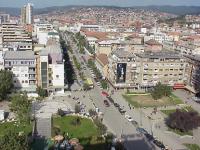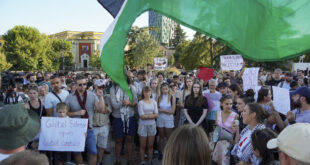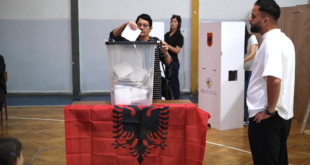 A former senior adviser to the British government has defended military intervention in Kosovo, ten years later, defining it as a “just war”.
A former senior adviser to the British government has defended military intervention in Kosovo, ten years later, defining it as a “just war”.
David Clark, who once served as European Advisor at the UK’s Foreign Office between 1997 and 2001, argued that the conflict in Kosovo was “a response to a humanitarian emergency, and was not a geopolitical power play.”
The remarks were made in an opinion piece published by London’s Guardian. Clark argued that the image of the intervention has been distorted over the past ten years, first depicted as a war of values to now considered a dry-run for the invasion of Iraq.
He wrote: “In departing from the principle of non-intervention and lacking a UN mandate, Kosovo is often regarded as the original sin that made Iraq possible.
“Even Russia’s invasion and recognition of Abkhazia and South Ossetia have been characterised as blowback from Kosovo’s declaration of independence a few months before.
“Comparisons of this kind confuse more than they clarify. The war in Kosovo was a response to a humanitarian emergency, not a geopolitical power play.”
He also dismisses the “alternative” version of history in which former Serbian president Slobodan Milosevic’s crimes are minimised or excused and a “rapacious west” is portrayed as the instigator of violence.
“In this history, his [Milosovic] efforts to reach a negotiated solution were sabotaged at the Rambouillet peace conference by Europe and the US; and the deaths and refugee movements inside Kosovo were caused by NATO bombing,” Mr Clark wrote.
“The reality is that by the time of Rambouillet, Western leaders had wised up to Milosevic’s game of rope-a-dope in which he negotiated peace in bad faith while continuing to unleash ethnic terror on the ground.
“The violence accelerated immediately before and after the start of the bombing campaign, but opponents deliberately invert cause and effect.”
The policy advisor under Tony Blair said that had Milosevic “completed his ethnic cleansing”, hundreds of thousands of Kosovo Albanians would remain in refugee camps.
He wrote: “A nationalist successor regime in Belgrade would have been dedicated to preserving his victorious legacy and destabilising the region with unfulfilled dreams of a Greater Serbia.
“The expulsion of the Kosovans would have joined al-Qaida’s rap sheet of ‘Crusader’ crimes against Muslims, an accusation doubtless echoed by the same critics who condemn NATO for preventing it.”
In his concluding remarks, he added: “The war in Kosovo was ultimately a question of whether the fall of the Berlin Wall would mark a return to the ethnic barbarism and power politics of the pre-cold war era, or a better phase in European history.
“That legacy has not been honoured as it should have been. Nevertheless, Kosovo should be remembered as an example of Western nations using their power, however imperfectly, to do something good and necessary.”
 Eurasia Press & News
Eurasia Press & News


